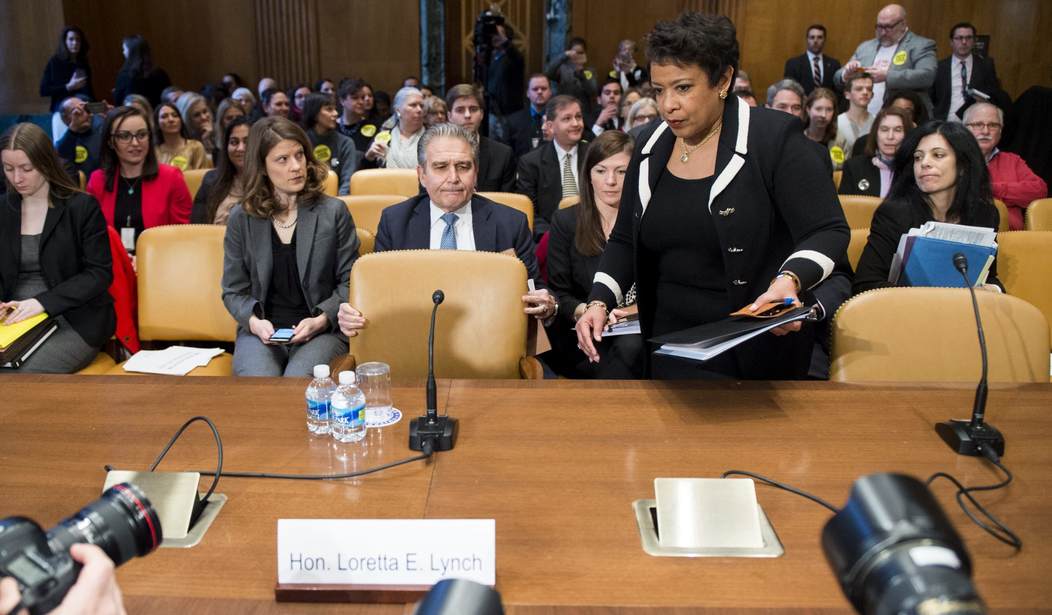Attorney General Loretta Lynch told lawmakers on the Hill today that she has “complete confidence that the common-sense steps announced by the president are lawful” but harbors “no illusions that these measures by themselves will end gun violence in America.”
“They clarify laws that are already on the books. Because clear notice will help ensure that those laws are followed,” Lynch told the Senate Appropriations Subcommittee on Commerce, Justice, and Science at a hearing to examine President Obama’s gun control executive orders.
“And do you believe that the rights granted by the Second Amendment are equally important as those granted by the First Amendment, the Fourth Amendment, the Fifth Amendment, the Seventh Amendment and so forth?” asked chairman Richard Shelby (R-Ala.). “Would you say that this is all an integral part of the Constitution?”
“Sir, I believe that the Bill of Rights and the subsequent amendments are indeed an integral part of the Constitution, as well as the case law that seeks to interpret them,” Lynch replied.
She cited specifically the Heller case handed down by the Supreme Court “that defined the 2nd Amendment and clarified the individual’s right to bear arms as well as the agency’s right to promulgate guidance therefrom as well.”
“With respect to the actions taken, I am confident that they are consistent with the laws of the land, they are within the president’s authority because they seek to enforce the existing laws, they seek to strengthen the provisions that Congress has directed that we undertake to keep the American people safe, such as the NICS [National Instant Criminal Background Check System] background system. They seek to enhance protections for those who have mental illness, providing greater treatment for them, another goal that I know this subcommittee supports.”
Lynch conceded, “I do not believe that we’re able to look back and find a specific measure that would prevent a specific crime” that sparked the latest push for gun control, “but that does not mean we must not seek to prevent future tragedies.”
The attorney general said gun sales are rising on the “dark net,” where the content is shielded on private networks.
“These are Internet sales where criminals are seeking to acquire firearms through which they can harm our American citizens. This is not a loophole per se, but it is an area of enforcement that the ATF has been focused on. …With respect to the individuals who operate at gun shows, flea markets and the like, there will be an educational component to the guidance. This information will be provided to them. They will be allowed to ask questions. And we believe that this will increase compliance and, frankly, lessen confusion among those individuals seeking to comply with the law,” she said.
“But where individuals operate on the dark net, primarily in illicit transactions, it will also put them on notice so that if enforcement actions need to be taken, there can be no discussion that they simply were not aware of this particular provision.”
Lynch noted that “hobbyists and collectors are not required to obtain a license in order to transfer firearms.”
Pressed on how the Social Security Administration will be involved in flagging people who are deemed unfit to possess firearms, she said the development of the process was in the very early stages.
“It’s important that we clarify, as other agencies have, which types of adjudications and which types of issues would require those records to come to NICS. So, the Social Security Administration is beginning that process. And certainly we look forward to providing whatever input and guidance they request from the Department of Justice on that as well,” she said.
“One of the things that will of course be part of that is, as with all of that, for example our V.A. administration already provides records. But one of the things that will be part of the process is making sure that any individual who may find themselves in that situation receives notice that that is a possibility. That is something that would be consistent with existing law and the Second Amendment,” Lynch continued. “And also that there is a way for an individual to apply to have their rights restored. Not just to own or possess a firearm, but anything else that might be a collateral consequence of a particular type of adjudication.”
The attorney general said she couldn’t yet predict “what types of adjudications the Social Security Administration would decide should be provided to the NICS system.”
Sen. John Boozman (R-Ark.) stressed that’s one component of the president’s plan that’s not simply clarifying existing law.
“This would prohibit them from the constitutional Second Amendment right, not based on due process, but only on the fact that they requested a family member or friend to assist them with their finances. I’m concerned with your department’s final ruling that revised some of the definitions regarding being adjudicated as a mental defective and committed to a mental institution to now more broadly cover folks who seek treatment. I’m concerned because these were not changed through Congress,” Boozman said. “And now you couple it with the upcoming Social Security rule.”








Join the conversation as a VIP Member